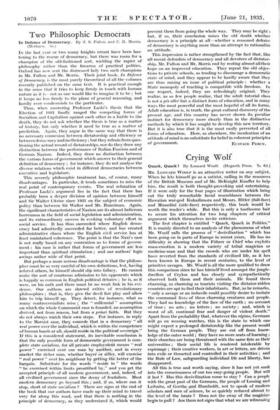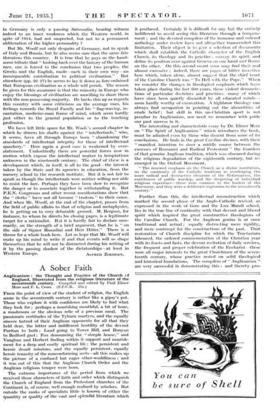Crying Wolf
Quack, Quack ! By Leonard Woolf. (Hogarth Press. 7s. 6d.)
Ma. LEONARD WOOLF is an attractive writer on any subject. When he lets hiniself go as a satirist, calling in the resources of the British Museum and of Mr. McKnight Kauffer to help him; the result is both thought-pr6voking and entertaining. If it were only for the fotir pages of illustration which bring out the truly remarkable facial resemblanee between the Hawaiian war-god Kukailimoru and Messrs. Hitler (full-face) and Musiolini (side-face) respectively, this book Would be worth the reader's while. But this is Only a toothsome bait to secure his attention for two long chapters of critical argument which theniselves invite criticism.
The first chapter is entitled " Quack, Quack in Politics." It is mainly directed to an analysis of the phenomena of what Mr. Woolf calls the process of " decivilization " which has been going on in parts of Europe in recent years. He has no difficulty in showing that the Fiihrer Or Chief who exploits mass-emotion is a modern variety Of tribal magician or medicine-man and that the crowds Who are -Under his spell have reverted from the standards of civilized life, as it has been known in Europe in recent centuries, to the level of primitive savages. Mr. Woolf is all the more qualified to draw this comparison since he has hirribelf lived amongst the jungle- dwellers of Ceylon and has closely and sympathetically observed both them and their animals. He found them charming, as charming as tourists visiting the dictator-ridden countries are apt to find their inhabitants. But, at he remarks, " only a savage or an imbecile could possibly desire to imitate the communal lives of these charming creatures and people. They had no knowledge of the face of the earth ; no account of time ; no arts ; no letters ; no society ; and, which. 'is worst of all, continual fear and danger of violent death." Apart from the probability that, whatever the regime, Germans will go on wearing watches, this is the state to which one might expect a prolonged dictatorship like the present would bring the German people. They are cut off from know- ledge of the outer world ; they have no more seats of learning ; their churches are being threatened with the same fate as their universities ; their social life is rendered intolerable by espionage ; their creative workers, in art or letters, are driven into exile or thwarted and controlled in their activities ; and the Rule of Law, safeguarding individual life and liberty, has disappeared.
All this is true and worth saying, since it has not yet sunk into the consciousness of our too easy-going people. But will it last ? Has this decivilization come to stay ? Can a people with the great past of the Germans, the people of Lessing and Leibnitz, of ,Goetlie.,apd Humboldt, not to speak of modern scholars and men, of science, be so quickly reduced almost to the level of the brute ? Does not the sway of the magician begin to pall ? Are there not signs that what we are witnessing in- Germany is only a passing Saturnalia, bearing witness indeed to an inner weakness which the Western world, in spite or1914, had not suspected, but not to a permanent obliteration of the higher personality ?
But Mr. Woolf not only despairs of Germany, not to speak of Italy and Russia, but he also seems sure that the same fate threatens this country. It is true that he pays us the hand- some tribute that " looking back over the history of the human race, one is forced to the conclusion that two peoples, the (reeks, and the English, made—each in their own way—an incomparable contribution to political civilization." But elsewhere (pp. 26-27) he seems to lay it down as fore-ordained that European civilization as a whole will perish. The reason he gives for this assurance is that the minority in Europe who enjoy the blessings of civilization are unwilling to share them with the non-possessing majority. He backs this up as regards this country with some Criticisms on the average man, his feelings towards the Royal Family and his " flag-waving, in- cantation, medicine-man frame of mind, which seem hardly just either to the general population or to the teaching profession.
We have left little space for Mr. Woolr's second chapter in which he directs his shafts against the " intellectuals," who, it seems, have all through Europe been " abandoning the standards of intellectual integrity for those of intellectual quackery." Here again a good case is weakened by over- statement. Undoubtedly there are powerful forces now in motion which expose the intellectual worker to temptations unknown in the nineteenth century. The chief of These is a development which, in itself, is all to the good—the interest taken by the State and its agencies in education, from the nursery school to the research institute. But it is not fair to speak as though the intellectuals were neither willing nor able to resist the lure. Perhaps they have been slow to recognize the danger or to associate together in withstanding it. But P.E.N. Congresses and other recent manifestations show that the " clerks " have not all become traitors " to their cause. And when Mr. Woolf, at the end of the chapter, passes from the field of public affairs to that of religion and metaphysics, he is getting on to very debatable ground. M. Bergson, for instance, to whom he directs his closing pages, is a legitimate target for a rationalist. But it is hardly fair to declare sum- marily, on the strength of a brief argument, that he is " on the side of Signor Mussolini and Herr Hitler." There is a theme for a whole book here. Let us hope that Mr. Woolf will make up his mind to write it and that events will so shape themselves that he will not be distracted during his writing of it by the passing shadow of the dictatorships-7at least in









































 Previous page
Previous page